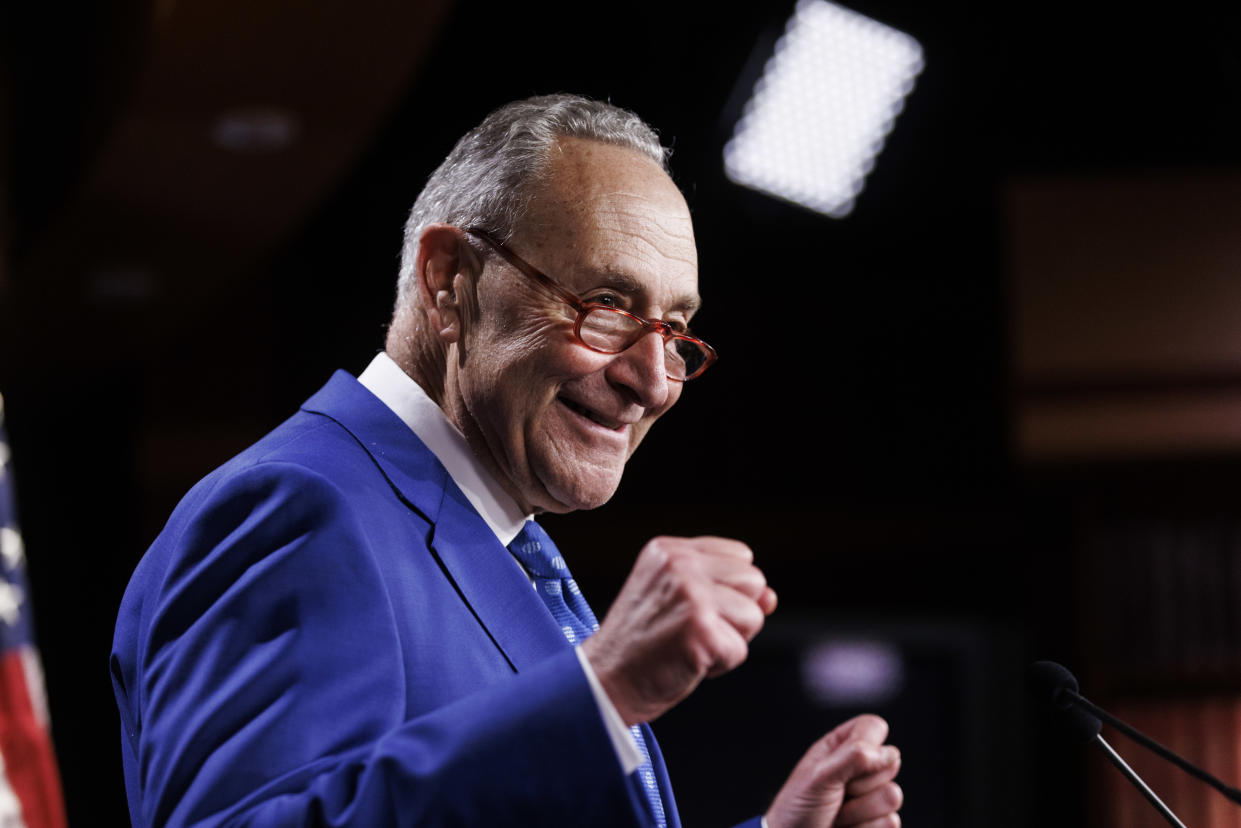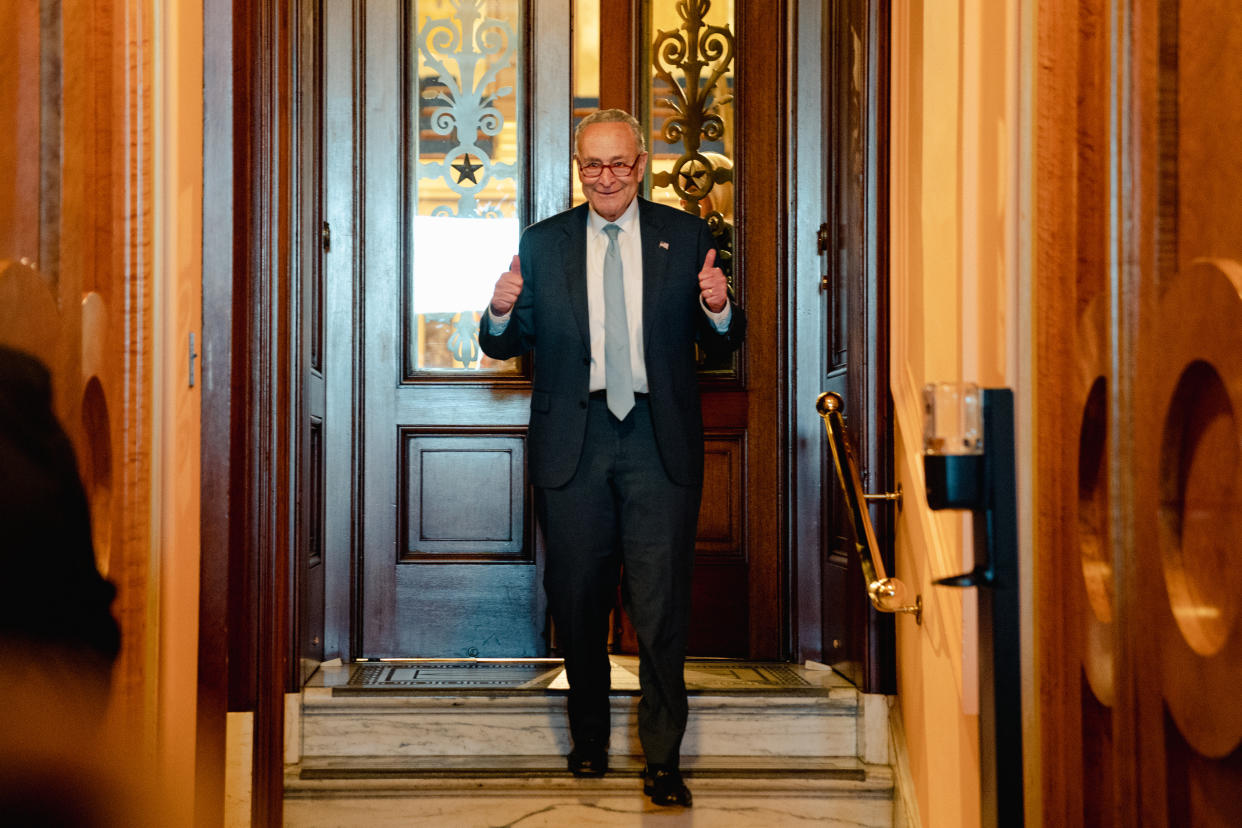Inflation Reduction Act: What's next for Democrats' climate and health care bill

Over the weekend, Senate Democrats passed the Inflation Reduction Act of 2022, legislation that would fulfill some of President Biden’s campaign promises on climate and prescription drugs. With passage in the House of Representatives likely to come later this week, Biden and Democrats are already celebrating the deal as they head into the final stretch before November’s midterms.
“Senate Democrats sided with American families over special interests, voting to lower the cost of prescription drugs, health insurance, and everyday energy costs and reduce the deficit, while making the wealthiest corporations finally pay their fair share,” Biden said in a statement Sunday. “I ran for President promising to make government work for working families again, and that is what this bill does — period.”
Below is a recap of what you missed over the weekend and what’s to come.
What happened over the weekend?
All 50 members of the Senate Democratic caucus pushed through the framework of the legislation brokered by Majority Leader Chuck Schumer and moderate Democratic Sen. Joe Manchin of West Virginia. The surprise deal resuscitated key pieces of Biden’s Build Back Better plan, a more ambitious spending package that failed to gain the support of all 50 Senate Democrats.

After a debate that took up most of the weekend and votes on a slew of amendments, the new legislation, rebranded as the Inflation Reduction Act, passed on Sunday afternoon. All 50 Republican senators opposed the bill, so Vice President Kamala Harris cast the tiebreaking vote.
The bill was channeled via the budget reconciliation process, allowing it to pass with a simple 50-vote majority instead of the typical 60-vote filibuster threshold. Reconciliation is routinely used for major budget-related legislation; other recent examples include the American Rescue Plan, passed with exclusively Democratic votes in March 2021, and former President Donald Trump’s tax plan, supported only by Republicans in December 2017.
How does it affect you?
The legislation contains the single biggest investment in climate in U.S. history, with standards to lower emissions and provide tax incentives and grants to help with the transition to clean energy. It would invest nearly $400 billion in clean energy, with the goal of reducing carbon emissions by 40% by 2030. This includes tax credits to spur the manufacturing of equipment like solar panels and wind turbines, as well as the purchase of electric vehicles. The bill includes funding for research and state programs, and money for reducing pollution and preserving forests and coastal habitats. Manchin also secured some negotiating wins for the oil pipeline industry, which has been one of his financial backers.

“This is a historic moment for climate action, and a turning point in American climate policy,” Jamal Raad, executive director of Evergreen Action, a climate advocacy group, said Sunday in a statement. “Today, the Senate passed the largest climate investment in history — by far. This is the end of a decades-long road to pass a climate bill, but it’s only the beginning of the road towards achieving the greenhouse gas pollution reductions that science demands and building a better future for us all.”
The legislation will also allow Medicare to directly negotiate with prescription drug companies, lowering the cost of medications and capping out-of-pocket drug costs for older Americans. It would provide subsidies for Obamacare premiums set to expire, keeping health care costs down for many Americans.
Funding for the bill will come from raising taxes on some corporations that make over $1 billion annually, taxing corporate stock buybacks and funding the IRS to go after tax cheats. The total legislative package is projected to lower the federal deficit by as much as $300 billion over the next decade.
What isn’t in the bill?
Democrats attempted to include a provision that would have capped the cost of insulin at $35 a month for Americans with private insurance. The party chose to heed a ruling by the Senate parliamentarian stripping that piece from the bill and tried to reinsert it with 60 votes, needing 10 Republicans to sign on in order to get around the legislative filibuster, which Democrats have opted to keep in place.
While the measure earned 57 yes votes to 43 nos, it was unable to satisfy the rules of the Senate and failed. (The seven Republican senators to support the capping of insulin copays were Bill Cassidy and John Kennedy of Louisiana, Lisa Murkowski and Dan Sullivan of Alaska, Susan Collins of Maine, Josh Hawley of Missouri and Cindy Hyde-Smith of Mississippi.) The final bill did include a $35 cap for older Americans who are on Medicare but did not include a general cap on drug price increases for those not on the government health care plan.

Democrats also needed to convince Sen. Kyrsten Sinema, a moderate Democrat from Arizona who, along with Manchin, helped kill Build Back Better, the previous iteration of the legislation. To win her support, Democrats had to remove a number of provisions that would have raised taxes on private equity, with the Washington Post estimating that it saved the industry about $35 billion over the next decade. Sinema also nixed a change that would have resulted in hedge fund and private equity fund managers paying higher taxes on their incomes.
Sen. Bernie Sanders of Vermont urged his colleagues to restore items that were in Biden’s original proposal but stripped from this one, including paid family leave and free prekindergarten. He proposed amendments that would have extended the expanded child tax credit — which took millions of children out of poverty in 2021 — and also provided Medicare recipients with dental, vision and hearing coverage. All those amendments failed, but Sanders voted for the bill’s final passage.
What’s next?
The bill will now move to the House for passage and then to Biden to be signed into law. In a statement Sunday, House Speaker Nancy Pelosi hailed the “landmark legislation” as “a victory for America’s families and for our planet,” saying the chamber “will return and move swiftly.” Majority Whip Steny Hoyer announced late last week that members should be ready to return from their August break and meet on Friday morning.

The vote in the House is expected to be a smooth one. There were initial concerns that a group of centrist Democrats, who slowed and stymied parts of the Biden agenda last year, could impede progress on the new bill over a provision that affects high-income individuals in states with higher taxes. But one of the leading figures in that group, Rep. Josh Gottheimer of New Jersey, issued a statement after Senate passage saying he was supporting the bill.
“After careful review, it is clear that the Inflation Reduction Act is good for the families and small businesses in northern New Jersey,” Gottheimer said in a statement. “This bill passes my key test that I’ve pushed for since day one: it does not raise taxes on individuals, families, or small businesses in my District.”

